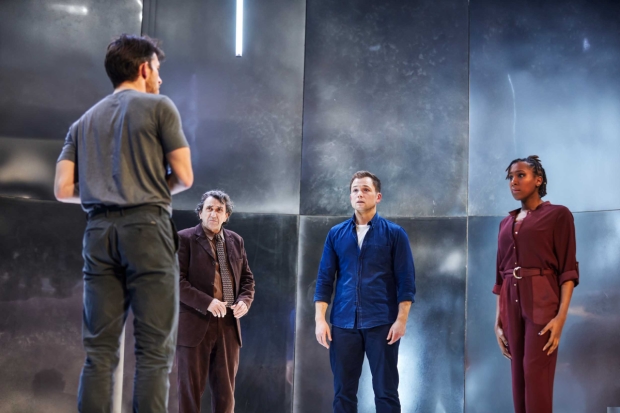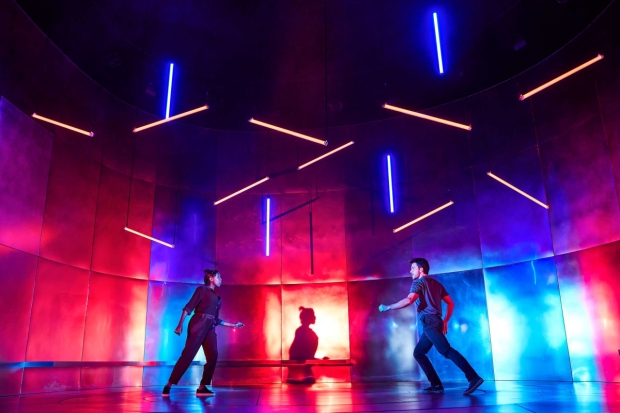Cock review – all-star West End revival is an arena of sexual dynamics
Mike Bartlett’s hit play returns with Jonathan Bailey, Taron Egerton, Jade Anouka and Phil Daniels

© Brinkhoff-Moegenburg
Mike Bartlett is an adamantine describer of human relationships. As shown in his television success, Doctor Foster, his view veers towards the bleak, his language lands with the precise brutality of the surgeons he depicted in Trauma.
Cock, written in 2009, has all the ferocity of the cock-fights that inspired it. In his introduction to this gleaming revival by Marianne Elliott he says that its form was conditioned by exactly that idea, of transferring human dynamics to the pit.
On Merle Hensel's gleaming, reflective set, shaped like an arena, with one revolving door, and benches round its steel walls, a dance of lust, love and shifting allegiance unfolds. It centres on John (Jonathan Bailey), who is in an apparently settled relationship with M (Taron Egerton) until one day he decides that they are incompatible.
But then he returns – with a dilemma. He has had sex with a woman W (Jade Anouka), and he is unsure what he wants to do. The entire play reaches its conclusion at a dinner party, hosted by M with his dad F (Phil Daniels, very funny) as an active fourth guest, trying to haul John back to his son's side.
The idea is that with the passage of time, Cock has become less a play about a self-obsessed man trying to find happiness and causing havoc for all around him, and more about gender identity and the right of everyone to define who they want to be, a scream against the polarities imposed by asking people to chose between polarities.
The lines certainly land with force: "I've never been with a woman," John announces to Anouka's wonderfully baffled W. "I find they're like water…when you want beer." He's constantly overwhelmed by choices he doesn't want to make. "People keep saying be myself. I have no idea what that is." But the play's bold tone of chilly, high comedy tends to make such lines theatrical rather than revealing; its gladiatorial setting, impeccably lit by Paule Constable, doesn't do much to diminish the crueller aspects of John's character.
Elliott's direction is icily acute; so is Annie-Lunnette Deakin-Foster's choreography which pitches John into slo-mo motion on a revolving stage. The scenes where he has sex with W keep their humour, because they are so stylised, with their exploration of each other's bodies taking place from opposite sides of the stage. Equally, when he sizes up his boyfriend's body – loving "even the fat bits" – the line and the idea are palatable because they are both fully-clothed.

© photo: Brinkhoff-Moegenburg
It's all terrifically clever and never dull as it unfolds over an unbroken hour and 45 minutes. But it is quite chilly. What saves the night are the performances. It says a lot about Bailey's appeal in Bridgerton and the impact Egerton has made in Kingsman and Rocketman that audiences are queuing round the block for the play.
It says even more about their talent that both are excellent. Bailey is almost perfectly cast, conveying a narcissist's knowledge of his own appeal – all charming smiles and sidelong flashes of the eyes – but also suggesting, as the play progresses, a real despair about his inability simply to fall for someone and be happy.
At first Egerton's city trader, all big shoulders and slightly bullying comments about Bailey's appearance and demeanour, seems like a classic alpha male, absolutely in charge of his life and his world. His disintegration as John tears up all his certainties, his attempt not to show his grief, and his little moues of sadness are entirely convincing.
Anouka makes a lot of the woman's part, again derailed by the unexpectedness of her feelings, by the suddenness of a future different from the one she had imagined opening up. It's a play that's easier to admire than to love, but nonetheless a challenging, fascinating contest to witness.












